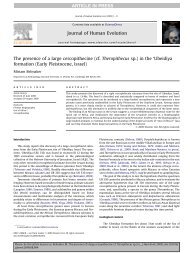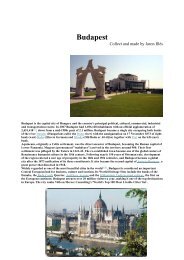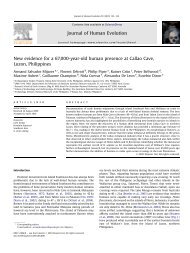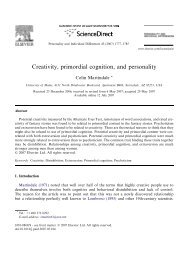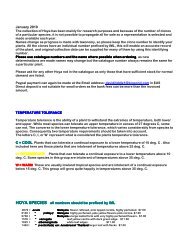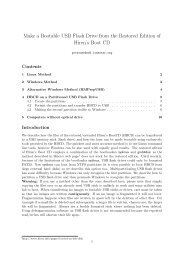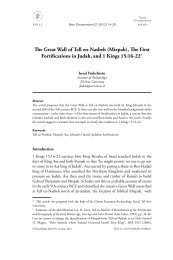David in the Service of King Achish of Gath: Renegade to His ...
David in the Service of King Achish of Gath: Renegade to His ...
David in the Service of King Achish of Gath: Renegade to His ...
Create successful ePaper yourself
Turn your PDF publications into a flip-book with our unique Google optimized e-Paper software.
74 Y. Shemesh / Vetus Testamentum 57 (2007) 73-90<br />
<strong>in</strong> <strong>the</strong> military campaign aga<strong>in</strong>st Israel (1 Sam. xxviii 1-2). In fact, <strong>David</strong> and<br />
his men did march with <strong>the</strong> Philist<strong>in</strong>e army as it advanced <strong>to</strong> <strong>the</strong> decisive<br />
battle at Mount Gilboa (1 Sam. xxix 2). Only <strong>the</strong> <strong>in</strong>tervention <strong>of</strong> <strong>the</strong> Philist<strong>in</strong>e<br />
commanders 2 kept <strong>David</strong> and his men out <strong>of</strong> <strong>the</strong> battle and sent <strong>the</strong>m <strong>to</strong><br />
<strong>the</strong> safe distance <strong>of</strong> Ziklag. Th e biblical narra<strong>to</strong>r says noth<strong>in</strong>g about <strong>the</strong> true<br />
<strong>in</strong>tentions <strong>of</strong> <strong>David</strong> and his men with regard <strong>to</strong> <strong>the</strong> impend<strong>in</strong>g battle. Th is<br />
leaves ample room for speculation: Is it really possible that <strong>David</strong> would have<br />
fought aga<strong>in</strong>st his people and his k<strong>in</strong>g, even if only because he had no choice<br />
<strong>in</strong> <strong>the</strong> matter as a result <strong>of</strong> <strong>the</strong> b<strong>in</strong>d <strong>in</strong> which he found himself at <strong>the</strong> time—<br />
persecuted by Saul and beholden <strong>to</strong> his patron, <strong>Achish</strong>, who had granted him<br />
asylum?<br />
In <strong>the</strong> present paper I hope <strong>to</strong> demonstrate, rely<strong>in</strong>g chiefly on a literary<br />
analysis, that for <strong>the</strong> biblical narra<strong>to</strong>r <strong>the</strong> possibility that <strong>David</strong> might fight<br />
aga<strong>in</strong>st his own people is absurd. Even though <strong>the</strong> narra<strong>to</strong>r does not say this<br />
<strong>in</strong> so many words, he provides ample h<strong>in</strong>ts that had <strong>David</strong> not been sent away<br />
he would have acted as a fift h column and raised his sword aga<strong>in</strong>st his patron,<br />
<strong>Achish</strong>, and not aga<strong>in</strong>st Saul and Israel.<br />
I must emphasize that <strong>the</strong> discussion deals exclusively with <strong>David</strong> as a literary<br />
character, as he is depicted <strong>in</strong> <strong>the</strong> s<strong>to</strong>ries about him, and not with <strong>the</strong><br />
his<strong>to</strong>rical figure, about whom we have no reliable <strong>in</strong>formation. Accord<strong>in</strong>gly<br />
I will not attempt <strong>to</strong> deal with <strong>the</strong> arguments <strong>of</strong> scholars who sought <strong>to</strong><br />
unveil <strong>the</strong> his<strong>to</strong>rical (as opposed <strong>to</strong> <strong>the</strong> literary) <strong>David</strong> and convicted him<br />
not only <strong>of</strong> plann<strong>in</strong>g <strong>to</strong> jo<strong>in</strong> <strong>the</strong> Philist<strong>in</strong>e army (or actually jo<strong>in</strong><strong>in</strong>g it, despite<br />
2) Th ese “commanders” or “<strong>of</strong>ficers” (Heb. μyrç) are not <strong>the</strong> “lords” (μynrs) mentioned <strong>in</strong><br />
verse 2, despite <strong>the</strong> problems with <strong>the</strong> s<strong>to</strong>ry. Accord<strong>in</strong>g <strong>to</strong> <strong>the</strong> narra<strong>to</strong>r, <strong>the</strong> Philist<strong>in</strong>e commanders<br />
are angry with <strong>Achish</strong> for br<strong>in</strong>g<strong>in</strong>g <strong>David</strong> along and demand that he be dismissed<br />
(vv. 3-5). By contrast, <strong>Achish</strong> <strong>in</strong>itially tells <strong>David</strong> that <strong>the</strong> lords disapprove <strong>of</strong> his presence<br />
(v. 6) and urges him <strong>to</strong> leave so as not <strong>to</strong> displease <strong>the</strong> lords (v. 7). Later, however, <strong>Achish</strong><br />
attributes <strong>the</strong> request that <strong>David</strong> be excluded from <strong>the</strong> army <strong>to</strong> <strong>the</strong> Philist<strong>in</strong>e commanders<br />
(v. 9), and this is consistent with what <strong>the</strong> narra<strong>to</strong>r reports. In several manuscripts <strong>of</strong> <strong>the</strong> Septuag<strong>in</strong>t,<br />
<strong>the</strong> negative οὐκ is miss<strong>in</strong>g from <strong>the</strong> last clause <strong>of</strong> verse 6, <strong>in</strong>dicat<strong>in</strong>g that <strong>Achish</strong> and<br />
<strong>the</strong> lords approve <strong>of</strong> <strong>David</strong>, but not <strong>the</strong> commanders. Several scholars subscribe <strong>to</strong> this solution<br />
(but it cannot expla<strong>in</strong> <strong>the</strong> reference <strong>to</strong> <strong>the</strong> lords <strong>in</strong> verse 7). Alter proposes a literary solution:<br />
<strong>in</strong> order <strong>to</strong> re<strong>in</strong>force his words, <strong>Achish</strong> attributes <strong>the</strong> decision <strong>to</strong> send <strong>David</strong> away <strong>to</strong> <strong>the</strong><br />
very highest echelon, substitut<strong>in</strong>g <strong>the</strong> lords for <strong>the</strong> commanders. See R. Alter, Th e <strong>David</strong> S<strong>to</strong>ry<br />
(New York and London, 1999), p. 181. See also H. J. S<strong>to</strong>ebe, Das Erste Buch Samuelis (KOM<br />
8/1; Gütersloh, 1973), pp. 501, 503. Bar Efrat, for his part, suggests that <strong>the</strong> lords accepted<br />
<strong>the</strong> commanders’ position. See S. Bar Efrat, 1 Samuel (A Bible Commentary for Israel; Tel<br />
Aviv and Jerusalem, 1996), p. 355 (Hebrew).




